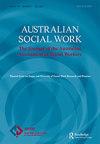特刊:我们的声音:被看到和听到
IF 2
3区 社会学
Q2 SOCIAL WORK
引用次数: 0
摘要
在《澳大利亚社会工作》(ASW)(2022)中的一期以土著为主题的文章之后,其中包括新的《土著和托雷斯海峡岛民作家文章和关于土著和托雷斯群岛岛民问题的拟议指南》(Bennett,2022),《华尔街日报》和解进程的下一个重要步骤是专门发行一期特刊,专门关注土著和托雷斯海峡岛民和作家,并为他们发声。2022年上一期Indigenous-themed的客座编辑重新召集:吉尼巴拉县的加米拉艾妇女宾迪·贝内特(Bindi Bennett)、贾格拉和图尔巴尔县(Meanjin)的贾巴尔妇女珍妮·布里泽(Jennie Briese),以及三位非土著编辑苏珊·盖尔(Susan Gair)(在伍古鲁卡巴和宾达尔县工作)和苏·吉利耶特(在Wadjuk Noongar Boodja),Fiona·麦克德莫特(在伍伦杰里地区)担任顾问。起初,人们讨论是否会有足够的兴趣,以及是否会出现必要数量的作者和文章。然而,很快就很明显,人们的兴趣很高,尽管原住民客座编辑相信质量和数量从来都不是问题,但对教育差距和其他重大障碍(如系统性种族主义和西方学术体系)导致的根深蒂固的机会缺乏的担忧是真正令人担忧的。2022年和2023年的这两个具有里程碑意义的问题都是为了最终确保原住民学者在治理关注原住民和托雷斯海峡岛民的问题中发挥积极、积极的作用。这些角色意味着设想谁可能做出贡献,确保对所有文章进行独立审查,审查所有文章以评估其适合性,为那些想要或需要的作者提供指导和支持,并定期开会讨论进展情况。审查和编辑工作不仅在工作量方面是一项挑战,而且在确保《日刊》的进程符合文化要求方面也是一项挑战。文化反应能力是“向来自我们自己和其他文化的人学习并尊重他们。它需要从他人的角度体验和思考事物的开放性”(Bennett&Bodkin Andrews,2021,第11页)。文化反应能力意味着团队必须做好以不同方式工作的准备。例如,我们联系了《华尔街日报》在英国的出版商泰勒和弗朗西斯,他们的《华尔街杂志》编辑部(JEO)根据《华尔街报》的指导方针检查文章。我们热衷于提高泰勒和弗朗西斯对原住民致谢的了解,我们创建了个性化的电子邮件来回复作者,联系他们提供指导,同时在这个过程中尊重和尊重所有原住民。我们并不总是做对。事实上,第一次通过ScholarOne在线提交文章时,由于作者对自己和承认国家的定位,文章没有提交,这不在《华尔街日报》的检查表上。不幸的是,未提交文章的标准电子邮件模板被发送给了原住民作者。我们很尴尬。我们还担心,我们的错误可能意味着原住民作者将退出这一过程,这将是《华尔街日报》的损失。该团队随后写了一封个人电子邮件,向作者致以衷心的歉意,并通过主编发送给作者。新的前进道路和问题-本文章由计算机程序翻译,如有差异,请以英文原文为准。
Special Issue: Our Voices: Being Seen and Heard
After an Indigenous-themed issue in Australian Social Work (ASW) (2022), which included the new Proposed Guidelines for Articles by Aboriginal and Torres Strait Islander Authors and About Aboriginal and Torres Strait Islander Issues (Bennett, 2022), an essential next step in the Journal’s Reconciliation process was to dedicate a Special Issue to solely centring and voicing Aboriginal and Torres Strait Islander peoples and authors. The Guest Editors of the prior Indigenous-themed issue in 2022 reconvened: Bindi Bennett, a Gamilaraay woman on Jinibara Country, Jennie Briese, a Giabal woman on Jagera and Turrbal Country (Meanjin), and three non-Indigenous editors, Susan Gair (working on Wulgurukaba and Bindal country), and Sue Gillieatt (on Wadjuk Noongar Boodja), with Fiona McDermott (on Wurundjeri land) as an advisor. At first, there was talk about whether there would be enough interest and whether the requisite number of authors and articles would emerge. However, it was clear very quickly that there was a high level of interest and although the Aboriginal Guest Editors were confident that quality and numbers were never the issue, worries about entrenched lack of opportunity due to the education disparity and other significant hurdles like systemic racism and western academic systems were real concerns. Both of these landmark Issues in 2022 and 2023 are about finally ensuring that Aboriginal scholars had active, vocal roles in the governance of issues that focus on Aboriginal and Torres Strait Islander peoples. These roles meant visioning who might contribute, ensuring the independent review of all articles, reviewing all articles to assess fit, offering mentoring and supporting those authors who wanted or needed it, and meeting regularly to discuss progress. Not only was the review and editing work a challenge in terms of workload, but it was also a challenge to ensure the Journal process was culturally responsive. Cultural responsiveness is the ability to “learn from and relate respectfully to people from our own and other cultures. It requires openness to experience and thinking about things from other people’s points of view” (Bennett & Bodkin-Andrews, 2021, p. 11). Cultural responsiveness meant the team had to be prepared to work in different ways. For example, we reached out to the Journal’s publisher, Taylor and Francis, in the United Kingdom, whose Journal Editorial Office (JEO) checks articles against Journal guidelines. We were keen to upskill Taylor and Francis about Indigenous Acknowledgements, and we created individualised emails to respond to authors, reaching out to them to offer mentoring, while at the same time honouring and respecting all Aboriginal peoples in this process. We did not always get it right. In fact, the first time an article was submitted online via ScholarOne, it was unsubmitted due to the authors’ positioning themselves and Acknowledging Country, which was not on the Journal’s checklist. Unfortunately, the standard email template for unsubmitting articles was sent to Aboriginal authors. We were embarrassed. We also were frightened that our mistake might mean Aboriginal authors would disengage from the process and that this would be a loss for the Journal. The team then penned a personal email with a heartfelt apology and sent it to the authors via the lead Editor. A new way forward and a problem-
求助全文
通过发布文献求助,成功后即可免费获取论文全文。
去求助
来源期刊

Australian Social Work
SOCIAL WORK-
CiteScore
4.20
自引率
16.70%
发文量
37
期刊介绍:
Australian Social Work is an international peer-reviewed journal reflecting current thinking and trends in Social Work. The Journal promotes the development of practice, policy and education, and publishes original research, theoretical papers and critical reviews that build on existing knowledge. The Journal also publishes reviews of relevant professional literature, commentary and analysis of social policies and encourages debate in the form of reader commentary on articles. Australian Social Work has grown out of the Australian context and continues to provide a vehicle for Australian and international authors. The Journal invites submission of papers from authors worldwide and all contributors are encouraged to present their work for an international readership.
 求助内容:
求助内容: 应助结果提醒方式:
应助结果提醒方式:


